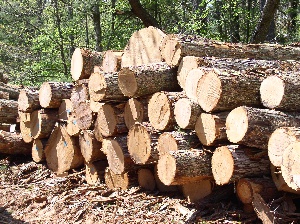The Domestic Lumber Trade Association of Ghana (DOLTA) has appealed to the government to waive tax on the importation of timber into the country.
The Association suggested that instead of importing logs which it said was too expensive and less beneficial, government should waive the tax on importation of sawn timber, to enable DOLTA import more.
Mr. Kofi Afreh Boakye, DOLTA Chief Executive Officer, made the appeal during a Forest Governance Contact Group Meeting, organized by Civic Response in Kumasi.
He said a cabinet memo on the waiver of import duty on lumber had been developed by the Forestry Commission, and was at the Ministry of Lands and Natural Resources for the past one year.
Mr Boakye, therefore, pleaded for the memo to be forwarded to Cabinet for consideration.
He said, currently logs were zero import duty, and VAT/NHIL-rated, but lumber attracted 20 percent import duty and 17.5 percent VAT/NHIL.
Mr. Boakye said a cost benefit analysis that was developed by the Timber Industry Development Division of Forestry Commission and DOLTA, on a supposed importation of logs from Westnaf Logging Company of Liberia, proved not to be feasible because the transaction would be far from breaking even.
He, therefore, called for the extension of zero-rated importation for logs, to cover that of lumber importation.
Mr. Boakye noted that currently the domestic market consumed over 600,000 cubic metres of lumber, and out of this, 500,000 cubic metres, representing about 84 percent, came from illegal sources.
He said the section four of the Domestic Market Policy's guiding principles, would help support the importation of lumber.
“Legislative Instrument (LI) 1649 prohibits the sale of chainsaw lumber in the country, but there is no clear cut sustainable source of legal lumber supply in the country,” he pointed out.
Mr. Boakye hinted, however, that the introduction of the Voluntary Partnership Agreement (VPA) would help to do away with the illegalities in the market.
On the benefits of government waiving taxes on lumber importation, Mr. Boakye said, it would ensure abundance of legal timber in the country, and also take care of overland export.
Mr. Samuel Mensah Mawutor, Coordinator of Forest Watch Ghana, and Campaigner in Civic Response, explained that the contact group meeting was a platform that discussed forest governance issues by relevant stakeholders.
The objectives were to share information with participants about the process and emerging issues in the forest sector, and to develop advocacy strategies on some of the issues that emerged from the contact group meeting.
Mr. Mawutor said two specific issues discussed by participants during the meeting were the Wildlife Bill in Parliament, and the role of civil society organizations in monitoring forest legality.
The Civic Response Campaigner said a drafted memorandum would soon be taken to Parliament, after the meeting and a communique summarizing the discussions with the media.
Business News of Thursday, 2 July 2015
Source: GNA

















